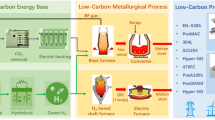Abstract
Iron and steel manufacturing is one of the most energy-intensive and CO2 emitting industries in the world. In order to contribute to the prevention of global warming, the reduction of CO2 from the steel works becomes a major issue imposed on the steel industry. A number of technologies have been developed in the past decade under worldwide CO2 breakthrough program for the reduction of carbon emissions. This chapter focuses on present needs, recent progress, and future trends of energy efficient new iron and steelmaking technologies. This study presents a comparative analysis of CO2 breakthrough programs including the present technological development and effects of application, economic feasibility, and environmental impact assessment. In addition, a brief analysis on ULCOS innovative ironmaking technologies has been done. Finally, significant CO2 reductions can be achieved by combining a number of the available energy efficient technologies with Bio-CCS.
Access this chapter
Tax calculation will be finalised at checkout
Purchases are for personal use only
Similar content being viewed by others
Notes
- 1.
ULCOS = Ultra-Low CO2 Steelmaking (EU).
- 2.
AISI = American Iron and Steel Institute with technology roadmap programme.
- 3.
POSCO = CO2 Breakthrough Framework (Korea).
- 4.
COURSE50 = CO2 Ultimate Reduction in Steelmaking process by innovative technology for cool Earth 2050.
References
Abbasi M, Farniaei M, Rahimpour M, Shariati A (2015) A feasibility study for synthesis gas production by considering carbon dioxide capturing in an industrial-scale methanol synthesis plant. Arab J Sci Eng 40(5):1255–1268. doi:10.1007/s13369-015-1598-9
Birat JP (2009a) Addressing the climate change challenge: ULCOS breakthrough program. Paper presented at the 157th ISIJ meeting, international organized sessions, environmental and energy technology/high temperature processes, Tokyo, Japan
Birat JP (2009b) CCS and the steel industry. Paper presented at the international conference on CCS regulation for the EU and China
Birat JP (2010) Carbon dioxide (CO2) capture and storage technology in the iron and steel industry. Woodhead Publishing Limited. Cambridge, UK.
Birat J, Maizière lès Metz D (2010) Steel sectoral report. Contribution to the UNIDO roadmap on CCS1-fifth draft JP. Birat, Arcelor Mittal Global R and D, Maizières-lès-Metz, France
Chen WH, Lin MR, Yu A, Du SW, Leu TS (2012) Hydrogen production from steam reforming of coke oven gas and its utility for indirect reduction of iron oxides in blast furnace. Int J Hydrog Energy 37(16):11748–11758
Choi HD (2013) Hybrid life cycle assessment of steel production with carbon capture and storage. Institutt for energi- og prosessteknikk, 76
Germeshuizen LM, Blom P (2013) A techno-economic evaluation of the use of hydrogen in a steel production process, utilizing nuclear process heat. Int J Hydrog Energy 38(25):10671–10682
Hasanbeigi A, Arens M, Price L (2014) Alternative emerging ironmaking technologies for energy-efficiency and carbon dioxide emissions reduction: a technical review. Renew Sustain Energy Rev 33:645–658
Ho MT, Bustamante A, Wiley DE (2013) Comparison of CO2 capture economics for iron and steel mills. Int J Greenhouse Gas Control 19:145–159
Kasahara S, Inagaki Y, Ogawa M (2012) Flow sheet model evaluation of nuclear hydrogen steelmaking processes with VHTR-IS (very high temperature reactor and iodine-sulfur process). ISIJ Int 52(8):1409–1419
Lin B, Wang X (2015) Carbon emissions from energy intensive industry in China: evidence from the iron & steel industry. Renew Sustain Energy Rev 47:746–754
Onarheim K, Mathisen A, Arasto A (2015) Barriers and opportunities for application of CCS in Nordic industry—a sectorial approach. Int J Greenhouse Gas Control 36:93–105
Siitonen S, Tuomaala M, Ahtila P (2010) Variables affecting energy efficiency and CO2 emissions in the steel industry. Energy Policy 38(5):2477–2485
Acknowledgement
The authors would like to extend their heartiest gratitude to the Ministry of Education, Malaysia for the financial support under the project of UM.C/625/1/HIR/MOHE/ENG/40- High Impact Research (HIR) Grant, Faculty of Engineering, University of Malaya, Malaysia.
Author information
Authors and Affiliations
Corresponding author
Editor information
Editors and Affiliations
Rights and permissions
Copyright information
© 2016 Springer International Publishing Switzerland
About this chapter
Cite this chapter
Quader, M.A., Ahmed, S., Ghazillaa, R.A.R. (2016). Recent Progress and Future Trends of CO2 Breakthrough Iron and Steelmaking Technologies for CO2 Mitigation. In: Cavaliere, P. (eds) Ironmaking and Steelmaking Processes. Springer, Cham. https://doi.org/10.1007/978-3-319-39529-6_22
Download citation
DOI: https://doi.org/10.1007/978-3-319-39529-6_22
Published:
Publisher Name: Springer, Cham
Print ISBN: 978-3-319-39527-2
Online ISBN: 978-3-319-39529-6
eBook Packages: Chemistry and Materials ScienceChemistry and Material Science (R0)




